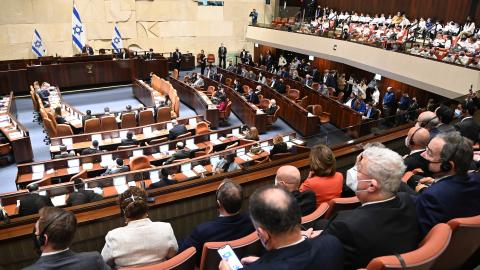The dispute in Israel about judicial reform continues to dominate the headlines, the airwaves and social media. At risk, we are told, is nothing less than the future of Israeli democracy.
There are sound reasons to be concerned. Democracy requires constant maintenance. While the wheels of the Israeli mechanisms of governance undoubtedly need recalibration, it is essential to do so without stripping the gears. The government’s proposals for necessary judicial reform carry potential dangers of their own.
Regrettably, argumentation has given way to assertion and debate has been replaced by name-calling. Proponents of reform have been quick to explain why it is necessary, but they have said little to allay internal opponents’ and external observers’ fears. Adding to the noise and distrust, many critics of the proposed reforms have repeatedly and falsely alleged the demise of Israeli democracy in the past. A few examples are illustrative.
In 2009, then-Foreign Minister Avigdor Lieberman advocated for requiring Israeli citizens to take a loyalty oath to the state. At the time, a now-familiar coalition of elected officials in the government and the opposition, as well as representatives of Jewish organizations and various friendly and hostile organizations abroad, voiced their concerns. The proposal was decried as “destructive for democracy.”
The proposal went through a series of revisions, leading to approval by the Cabinet in October 2010 of a version that would apply only to non-Jews newly acquiring Israeli citizenship. Before it was sent for approval to the Knesset, then-Prime Minister Benjamin Netanyahu directed that the proposed legislation be rewritten to include all new citizens, Jewish and non-Jewish alike. The bill never reached a vote in the Knesset. The loyalty oath controversy was over.
Neither the proposed oath nor the subsequent flap destroyed or even threatened democracy. Instead, the affair demonstrated the effectiveness and robustness of Israel’s democratic institutions. A hardline proposal was met with opposition from elected officials and parts of the public and the press. The result was a substantially watered-down proposal that failed to gain enough support to pass. Israeli democracy worked.
Similar examples followed. In 2016, a proposal requiring non-governmental organizations to reveal foreign government funding when they appeared in the Knesset was labeled “a danger to democracy.” A softened version of the bill ultimately passed, requiring NGOs to disclose if more than half of their funding comes from foreign governments. The U.S. House of Representatives has a similar rule (known as “Truth in Testimony”) that requires witnesses to disclose any foreign government funding received in the previous three years. The U.S. rule is stricter than its Israeli counterpart, yet it appears not to pose a danger to American democracy.
Another 2016 law, branded “the end of Israeli democracy,” allows a 90-seat majority (three-quarters) in the Knesset to expel members found to support armed struggle against Israel or to incite to racial hatred. Here, too, the U.S. bar is lower. The Constitution allows members of each house to punish their colleagues for “disorderly behavior” and to expel members with the “concurrence of two-thirds.”
One wonders why longstanding legal provisions in the United States and other democracies are argued to be undemocratic when adopted by the Jewish state.
Nevertheless, the proposed judicial reforms in Israel do raise questions about their long-term effects on the separation of powers and on protecting the minority from the tyranny of the majority. These are matters of significant gravity that demand and deserve patient, thoughtful consideration. The government should explain how it intends to ensure balance between the branches of government and protections for all citizens. Majority rule demands restraint and responsibility.
Protest and criticism are essential parts of the democratic process, but they too demand restraint and responsibility. Many of the most vocal critics of the reform proposals are the same ones who have been crying wolf about the death of Israeli democracy for years. Now that a serious conversation is in order about Israeli democracy, they have made it harder to know if a wolf really is threatening the sheep. They find themselves having undermined their own credibility among their most important interlocutors.















